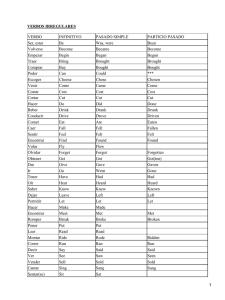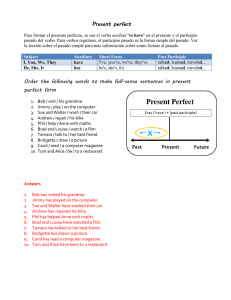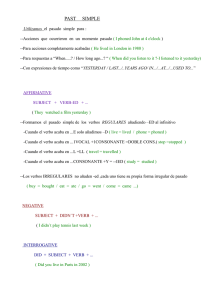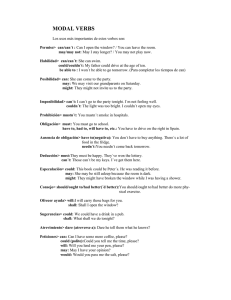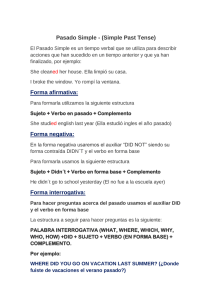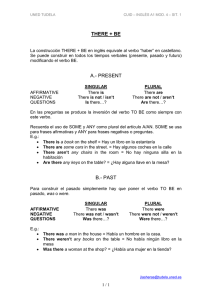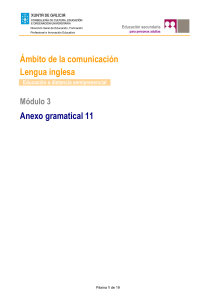SEMANA 6_INGLES COMERCIAL
Anuncio
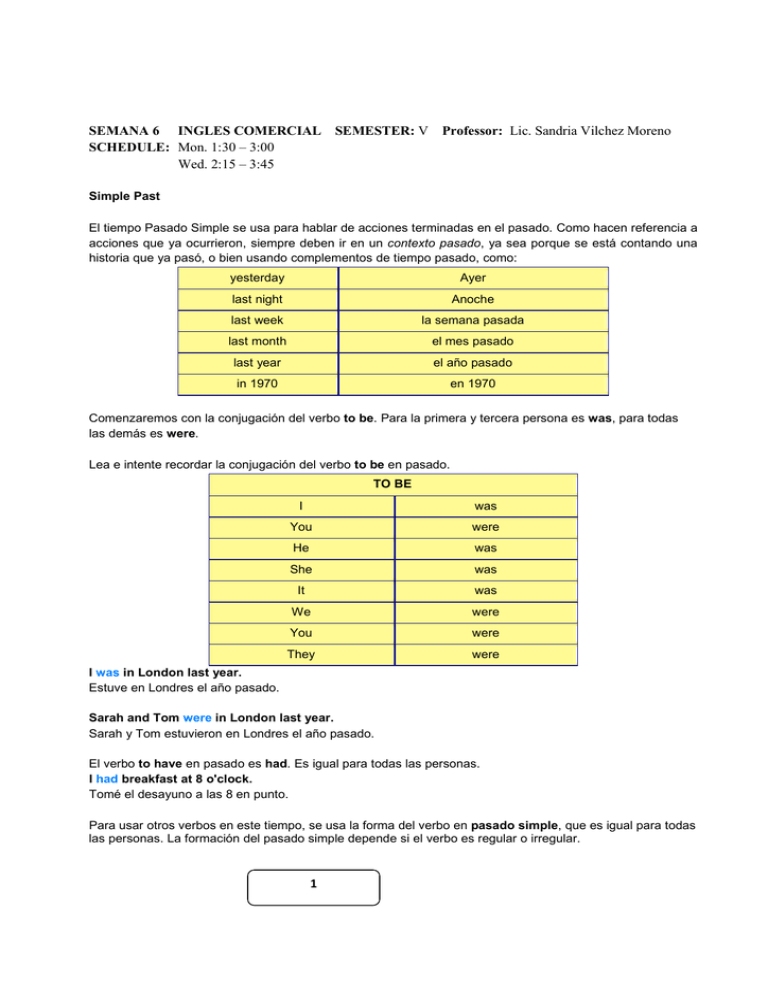
SEMANA 6 INGLES COMERCIAL SCHEDULE: Mon. 1:30 – 3:00 Wed. 2:15 – 3:45 SEMESTER: V Professor: Lic. Sandria Vilchez Moreno Simple Past El tiempo Pasado Simple se usa para hablar de acciones terminadas en el pasado. Como hacen referencia a acciones que ya ocurrieron, siempre deben ir en un contexto pasado, ya sea porque se está contando una historia que ya pasó, o bien usando complementos de tiempo pasado, como: yesterday Ayer last night Anoche last week la semana pasada last month el mes pasado last year el año pasado in 1970 en 1970 Comenzaremos con la conjugación del verbo to be. Para la primera y tercera persona es was, para todas las demás es were. Lea e intente recordar la conjugación del verbo to be en pasado. TO BE I was You were He was She was It was We were You were They were I was in London last year. Estuve en Londres el año pasado. Sarah and Tom were in London last year. Sarah y Tom estuvieron en Londres el año pasado. El verbo to have en pasado es had. Es igual para todas las personas. I had breakfast at 8 o'clock. Tomé el desayuno a las 8 en punto. Para usar otros verbos en este tiempo, se usa la forma del verbo en pasado simple, que es igual para todas las personas. La formación del pasado simple depende si el verbo es regular o irregular. 1 Verbos regulares En el caso de los verbos regulares, el pasado simple se forma tomando el propio verbo y agregando "ed", o "d" si termina en vocal. Si termina en "y", se cambia por "ied". We played tennis for two hours. Jugamos tenis por dos horas. You studied a lot. Estudiaste mucho. She arrived late. Llegó tarde. Mary watched a good movie yesterday. Mary vio una buena película ayer. Verbos irregulares Los verbos irregulares tienen su propia forma del pasado simple y la única manera de aprenderlos es memorizarlos. Normalmente son los que aparecen en la segunda columna de los listados de verbos irregulares en los diccionarios de inglés. Por ejemplo el pasado del verbo to go (ir) es "went". El pasado de to see (ver) es "saw". Siempre es igual para todas las personas. We went to London in 1994. Fuimos a Londres es 1994. We saw the double-decker buses. Vimos los autobuses de dos pisos. La forma interrogativa se compone del auxiliar DID seguido de la persona y el verbo en infinitivo. El auxiliar es igual para todas las personas. TO GO Did I go ? Did You go ? Did He go ? Did She go ? Did It go ? Did We go ? Did You go ? Did They go ? Para realizar una pregunta se usa la "question word" adelante. Where did you go? ¿Dónde fuiste? When did you go to London? ¿Cúando fuiste a Londres? La forma negativa se compone de la persona, seguido del auxiliar DID, seguido de NOT y el verbo en infinitivo. En lenguaje informal, puede usarse la forma contracta didn't. TO GO I did not go = I didn't go You did not go = You didn't go He did not go = He didn't go She did not go = She didn't go It did not go = It didn't go 2 We did not go = We didn't go You did not go = You didn't go They did not go = They didn't go Presentamos aquí una pequeña lista de algunos verbos irregulares con su pasado simple. Intente recordarlos y estúdielos! INFINITIVO PASADO SIMPLE go (ir) went have (tener) had write (escribir) wrote read (leer) read catch (atrapar) caught fall (caer) fell hear (escuchar) heard see (ver) saw say (decir) said give (dar) gave know (saber) knew EXERCISES Put the verbs into the correct form (simple past). 1. Last year I (spend) __spent__ my holiday in Ireland. 2. It (be) __________ great. 3. I (travel) ________ around by car with two friends and we (visit) ________ lots of interesting places. 4. In the evenings we usually (go) _________ to a pub. 5. One night we even (learn) __________ some Irish dances. 6. We (be) __________ very lucky with the weather. 7. It (not / rain) ____________ a lot. 8. But we (see) ___________ some beautiful rainbows. 9. Where (spend / you) __________ your last holiday? Exercise on negative sentences. Rewrite the sentences in the negative. 1. 2. 3. 4. 5. 6. They collected postcards. → ____They didn’t collect postcards_______. You jumped high. → _________________________________________. Albert played soccer. → _____________________________________. The teacher tested our English. → _____________________________. Fiona visited her grandma. → _________________________________. He washed the car. → _______________________________________. 3 7. 8. 9. 10. You were thirsty. → _________________________________________. He had a computer. →_______________________________________. I bought bread. → __________________________________________. You saw the house. →_______________________________________. Have a look at James's last week's diary and answer the questions in complete sentences. Put the time expression at the end of the sentence. 1. 2. 3. 4. 5. 6. 7. 8. 9. 10. 11. Mon Tue Wed Thu Fri football shopping Meeting call Jane buy flowers cinema Tennis English Italian restaurant Sat Sun concert sailing When was his English course? → _____His English course was on Thursday____. When did he go shopping? →__________________________________________. When did he buy flowers? → __________________________________________. When was his meeting? → ____________________________________________. When did he play football? → __________________________________________. When did he go to the Italian restaurant? →_______________________________. When did he call Jane? → ____________________________________________. When did he go to the cinema? →_______________________________________. When did he play tennis? → ___________________________________________. When was the concert? →_____________________________________________. When did he go sailing? →____________________________________________. COMPLETE THE QUESTIONS 1. (you/speak)____________________ to Angela last week? What year (Columbus/discover)___________________ America? Why (you/not/come) ____________________ to my birthday party? What year (Elvis/die) ______________________? Was it 1977 or 1978? How much (you/pay) __________________for your CD player? When (you/play/last) ___________________ volleyball with Jim? Which hotel (you/stay) _________________ in when you were in London? How many times (Tom/take) __________________his driving test before he passed? 4 READING Read and choose the correct alternative. A PERFECT DAY The day (1) .......... terribly. My alarm (2) .......... and I (3) .......... the house with only 1 hour to spare before the plane (4).......... due to take off. Luckily there (5) .......... very little traffic and I (6) .......... at the airport with 30 minutes to spare. I (7) .......... in at the gate and (8).......... for a coffee. Just as I (9).......... down, the announcer (10) .......... my flight. I (11) .......... my coffee quickly, too quickly in fact as I (12) .......... some on my shirt. I (13) .......... the sign to the departure gate and (14) .......... through passport control. I (15) .......... down in the departure lounge. It (16) .......... full of teenagers, obviously a school trip. They (17) .......... a terrible noise. And then I (18) .......... that terrible announcement, the one you don't want to hear. There (19)….......... a problem with the engine. I (20) .......... around for a place to get another coffee. I (21) ….......... a drinks machine so I .......... over to get some. I (22) .......... in my money and .......... the button for black coffee. When I (23).......... up the cup, it (24).......... only water. At that moment, the hostess (25) .......... that the plane was delayed because of bad weather. 1. took care of 2. didn’t give up 3. left 4. didn’t go 5. was 6. went 7. checked 8. started 9. went 10. sang 11. spat 12. spilled 13. looked after 14. went 15. hurried 16. was 17. were happening 18. heard 19. arrived 20. saw 21. looked over / went 22. put / pressed 23. took 24. went in 25. announced announced didn’t begin entered wished existed terminated stood shouted sat whistled drank dropped followed discussed came happened were smoking listened happened looked saw / felt put / pulled pushed got up called 5 finished didn’t wake up quitted became had reached waited went jumped shouted sang spread discussed smiled went suggested were doing felt were had saw / went threw / pressed pulled filled spoke began didn’t go off goodbyed was turned over arrived stamped whistled drank called looked for smiled ran after went under sat disappeared were making spoke was was looked over / felt threw / pulled picked contained mimed
